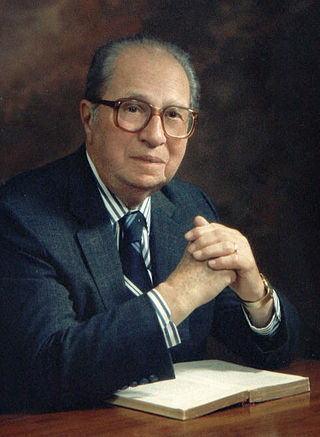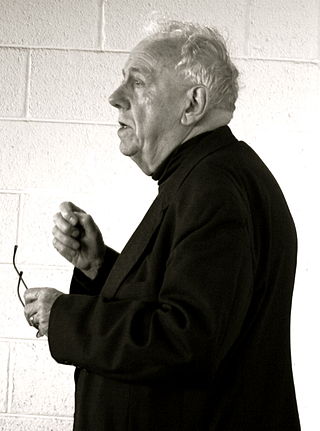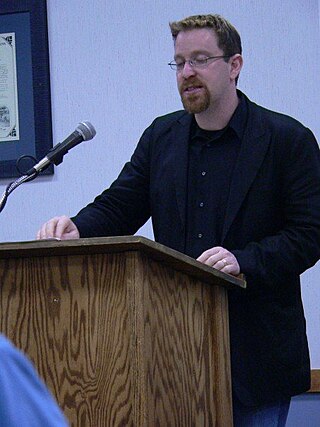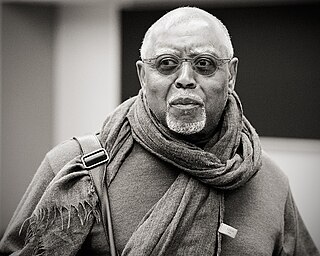
Mortimer Jerome Adler was an American philosopher, educator, encyclopedist, and popular author. As a philosopher he worked within the Aristotelian and Thomistic traditions. He taught at Columbia University and the University of Chicago, served as chairman of the Encyclopædia Britannica board of editors, and founded the Institute for Philosophical Research.
Montclair State University (MSU) is a public research university in Montclair, New Jersey, with parts of the campus extending into Clifton and into Little Falls. As of fall 2018, Montclair State was, by enrollment, the second largest public university in New Jersey. As of November 2021, there were 21,005 total enrolled students: 16,374 undergraduate students and 4,631 graduate students. It is classified among "R2: Doctoral Universities – High research activity". The campus covers approximately 252 acres (1.02 km2). The university offers more than 300 majors, minors, and concentrations.

Alasdair Chalmers MacIntyre is a Scottish-American philosopher who has contributed to moral and political philosophy as well as history of philosophy and theology. MacIntyre's After Virtue (1981) is one of the most important works of Anglophone moral and political philosophy in the 20th century. He is senior research fellow at the Centre for Contemporary Aristotelian Studies in Ethics and Politics (CASEP) at London Metropolitan University, emeritus Professor of Philosophy at the University of Notre Dame, and permanent senior distinguished research fellow at the Notre Dame Center for Ethics and Culture. During his lengthy academic career, he also taught at Brandeis University, Duke University, Vanderbilt University, and Boston University.
Philosophy for Children, sometimes abbreviated to P4C, is a movement that aims to teach reasoning and argumentative skills to children. There are also related methods sometimes called "Philosophy for Young People" or "Philosophy for Kids". Often the hope is that this will be a key influential move towards a more democratic form of democracy. However, there is also a long tradition within higher education of developing alternative methods for teaching philosophy both in schools and colleges.
Virgil Charles Aldrich, was an American philosopher of art, language, and religion.

Socrates Café are gatherings around the world where people from different backgrounds get together and exchange philosophical perspectives based on their experiences, using the version of the Socratic Method developed by founder Christopher Phillips. The groups model their discussions from the 2001 book of the same name by Christopher Phillips and a guide he also developed. Today, there are hundreds of such gatherings, coordinated by volunteers, worldwide.
Patrick Colonel Suppes was an American philosopher who made significant contributions to philosophy of science, the theory of measurement, the foundations of quantum mechanics, decision theory, psychology and educational technology. He was the Lucie Stern Professor of Philosophy Emeritus at Stanford University and until January 2010 was the Director of the Education Program for Gifted Youth also at Stanford.
Morton White was an American philosopher and historian of ideas. He was a proponent of a doctrine he called holistic pragmatism and also a noted scholar of American intellectual history. He was a professor in the Department of Philosophy at Harvard from 1953 to 1970. He was Professor Emeritus in the School of Historical Studies at the Institute for Advanced Study in Princeton, NJ, where he served as Professor in the School of Historical Studies from 1970 until he retired in 1987.
Women have made significant contributions to philosophy throughout the history of the discipline. Ancient examples include Maitreyi, Gargi Vachaknavi, Hipparchia of Maroneia and Arete of Cyrene. Some women philosophers were accepted during the medieval and modern eras, but none became part of the Western canon until the 20th and 21st century, when some sources indicate that Susanne Langer, G.E.M. Anscombe, Hannah Arendt and Simone de Beauvoir entered the canon.
East Orange High School was a comprehensive community public high school serving students in ninth through twelfth grades from 1891 to 2002 in East Orange, in Essex County, in the U.S. state of New Jersey. For most of its existence, the school operated as one of the two secondary schools of the East Orange School District.

Evelyn Wynona Lipman was an American Democratic Party politician who represented the 29th Legislative District in the New Jersey Senate. Lipman became the first African-American woman to be elected to the Senate when she won her seat in 1971, and her 27 years of service made her the Senate's longest-serving member at the time of her death.
Gareth B. Matthews was an American philosopher who specialized in ancient philosophy, medieval philosophy, philosophy of childhood and philosophy for children.

Christopher Phillips is an American author, educator, consultant, lecturer, and pro-democracy advocate. He is best known for his 2001 book Socrates Café. Public Radio International called Phillips the "Johnny Appleseed of Philosophy."

Jack Russell Weinstein is an American philosopher specializing in the history of philosophy, political philosophy, Adam Smith, and contemporary liberal theory. He is currently a Chester Fritz Distinguished Professor in the Department of Philosophy and Religion at the University of North Dakota. He is the director of The Institute for Philosophy in Public Life and the host of the public radio show Why? Philosophical discussions about everyday life. He was an influential student activist in the 1980s.

Leonard Harris is a professor of philosophy at Purdue University, where he has directed the Philosophy and Literature Ph.D. program and the African American Studies and Research Center. Before Purdue he taught at Morgan State University, a public, historically Black research university in Baltimore, where he created and directed a Philosophy for Children Center as an affiliate of the Institute for the Advancement of Philosophy for Children at Montclair State University. He wrote about his experience introducing philosophy to Washington, D.C. public schools in his book, Children in Chaos: A "Philosophy for Children" Experience. Before Morgan State, Harris taught at the University of the District of Columbia in Washington, D.C., and at Livingston College, Rutgers University in New Jersey. A leader in the field of critical pragmatism, Harris is one of the most innovative American philosophers of his time. His agenda of "struggle philosophy" moves beyond analytic and instrumentalist reasoning and Socratic dialogue to incorporate an "ethics of insurrection," "advocacy aesthetics," and the concept of racism as "necro-being." In addition, Harris has been largely responsible for the renewed, contemporary interest in the life and philosophy of the American philosopher, and "Dean" of the Harlem Renaissance, Alain LeRoy Locke. Harris is a board member of the Alain L. Locke Society and a founding member of the Philosophy Born of Struggle Association. His most important publications include A Philosophy of Struggle: The Leonard Harris Reader, edited by Lee A. McBride III for Bloomsbury (2020), Philosophy Born of Struggle: Afro-American Philosophy from 1917, Racism, The Critical Pragmatism of Alain Locke, with Jacoby A. Carter, Philosophic Values and World Citizenship: Locke to Obama and Beyond, and, with Charles Molesworth, Alain L. Locke: Biography of a Philosopher. Among Harris's awards are the Herbert Schneider Award "for distinguished contributions to the understanding of American Philosophy" in 2018, the Franz Fanon Lifetime Achievement Award presented by the Caribbean Philosophical Association in 2014, Howard University's 1999 Alain L. Locke Award, given in recognition for pioneering efforts and outstanding contributions to research in Africana Philosophy and Alain Locke Scholarship, and special recognition by the American Philosophical Association in 1996 for outstanding contribution to the profession.
John Schultz was an American writer of fiction and non-fiction. He was also a teacher of writing, the creator of the Story Workshop method of writing instruction, and an emeritus professor in the Fiction Writing Department at Columbia College Chicago. He was born on July 28, 1932, in Iberia, Missouri, served as an army medic from 1953 to 1955, and then worked in Chicago as a writer and teacher. He died in 2017 at the age of 84 in his home of Riverside, a suburb of Chicago.
American philosophy is the activity, corpus, and tradition of philosophers affiliated with the United States. The Internet Encyclopedia of Philosophy notes that while it lacks a "core of defining features, American Philosophy can nevertheless be seen as both reflecting and shaping collective American identity over the history of the nation". The philosophy of the Founding Fathers of the United States is largely seen as an extension of the European Enlightenment. A small number of philosophies are known as American in origin, namely pragmatism and transcendentalism, with their most prominent proponents being the philosophers William James and Ralph Waldo Emerson respectively.
Harry Stottlemeier's Discovery is a philosophical novel for children written by Matthew Lipman. The novel was Lipman's first, and inaugurated the educational movement known as Philosophy for Children. It was first published in 1971 and revised in 1974.

Sue Knight is an Australian philosopher, educator and academic whose research focuses on teaching reasoning skills and embedding philosophy within school curricula. She is the author of the Primary Ethics curriculum, which has been offered as an alternative to Scripture in New South Wales public schools for students from Kindergarten to Year 6 since 2010.
Ann E. Berthoff was a scholar of composition who promoted the study of I.A. Richards and Paulo Freire and the value of their work for writing studies.







